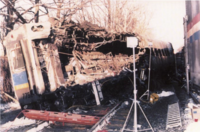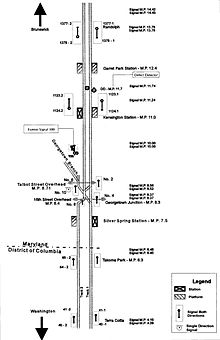Welcome to DU!
The truly grassroots left-of-center political community where regular people, not algorithms, drive the discussions and set the standards.
Join the community:
Create a free account
Support DU (and get rid of ads!):
Become a Star Member
Latest Breaking News
Editorials & Other Articles
General Discussion
The DU Lounge
All Forums
Issue Forums
Culture Forums
Alliance Forums
Region Forums
Support Forums
Help & Search
Maryland
Related: About this forumOn this day, February 16, 1996, two passenger trains collided in Silver Spring, Maryland.
Tue Feb 16, 2021: On this day, February 16, 1996, two passenger trains collided in Silver Spring, Maryland.
Twenty-five years ago. How could it have been so long? I was wondering just yesterday what day this happened.
Sat Feb 16, 2019: Twenty-three years ago today: Capitol Limited wreck at Silver Spring
I went through the site Wednesday evening (both ways) on the Red Line.
1996 Maryland train collision

Aerial photograph of the collision. The MARC commuter train is on the left, the Capitol Limited on the right.
On February 16, 1996, a MARC commuter train collided with Amtrak's Capitol Limited passenger train in Silver Spring, Maryland, killing three crew and eight passengers on the MARC train; a further eleven passengers on the same train and fifteen passengers and crew on the Capitol Limited were injured.
An investigation by the National Transportation Safety Board (NTSB) found that the crew of the MARC train had forgotten the indication of an approach signal which they had passed before a station stop, and as a consequence could not slow down in time after encountering a stop signal. The crash led to the creation of comprehensive federal rules for passenger car design, the first in the history of passenger service in the United States, as well as changes to operating rules. Total damage was estimated at $7.5 million.
Accident
The two-track railroad line between Brunswick, Maryland, and Union Station in Washington, D.C., is owned by CSX Transportation (save for approaches to Union Station) and is known as the Metropolitan Subdivision. MARC operates commuter services, known as the Brunswick Line, from Washington to Brunswick and points west. Amtrak operates the single daily Capitol Limited, a Washington–Chicago overnight train, over the route as well, though it makes fewer stops.
MARC No. 286 departed Brunswick at 4:30 p.m. Eastern time on February 16, 1996, traveling inbound/eastbound. No. 286 was a Brunswick–Washington, D.C., commuter train with a scheduled arrival at Union Station of 5:30 pm. The NTSB described the conditions that day as a "blowing snowfall" with a 5-inch (130 mm) accumulation. At the time CSX provided the operating crew for MARC commuter trains under contract to the Maryland Mass Transit Administration; aboard were an engineer, conductor, and assistant conductor. The train consisted of an EMD GP39H-2 diesel locomotive, two passenger coaches, and a control car. The train operated in push-pull mode, meaning that the locomotive was on the rear of the train and the locomotive engineer controlled operations from the control car in the front. MARC No. 286 had twenty passengers on board.
Amtrak No. 29, the Capitol Limited, departed Union Station at 5:25 pm, traveling outbound/westbound towards Chicago. That day the Capitol Limited consisted of two diesel locomotives, a GE P40DC no. 811 and an EMD F40PHR, no. 255; six material handling cars; a baggage car; a Superliner transition sleeping car; two Superliner sleeping cars; a Superliner dining car; a Superliner Sightseer Lounge car; two Superliner coaches; and a Hi-Level dormitory-coach. The Capitol Limited had four crew, fourteen service personnel, and 164 passengers on board.
Collision damage

Railway car knocked off the tracks with its right side sheared off
MARC II cab control car #7752

Derailed diesel locomotive with significant damage in the front
Amtrak EMD F40PHR No. 255
The two tracks of the Metropolitan Subdivision are numbered 1 and 2. MARC No. 286 was on track 2, having made a flag stop at Kensington to pick up two passengers. The Capitol Limited was also on track 2, having passed a stopped freight train on track 1. Both trains were approaching Georgetown Junction, where the Capitol Limited was to switch to track 1. The signal protecting Georgetown Junction indicated STOP on track 2, which would have the effect of stopping MARC No. 286 and permitting the Capitol Limited to change tracks. Before reaching Kensington MARC No. 286 passed an APPROACH signal. The purpose of that signal was to warn the train's crew that the next signal would be a stop signal and that maximum speed was restricted to 30 miles per hour (48 km/h). For reasons unknown the crew of MARC No. 286 did not obey this restriction and after departing Kensington the train reached 66 miles per hour (106 km/h) before the crew applied the emergency brakes. The Capitol Limited had reached Georgetown Junction and begun crossing over to track 1. MARC No. 286 struck the Amtrak train at approximately 38 miles per hour (61 km/h) at 5:39 pm.
All three crew members aboard the MARC train were killed along with eight passengers. 26 people were injured. The collision destroyed both MARC passenger cars and the control car as well as one of the two Amtrak locomotives, EMD F40PHR No. 255. The turnouts at Georgetown Junction were damaged and had to be replaced. The total damage was estimated at $7.5 million.
Investigation

Track diagram of the collision area
{snip}

Aerial photograph of the collision. The MARC commuter train is on the left, the Capitol Limited on the right.
On February 16, 1996, a MARC commuter train collided with Amtrak's Capitol Limited passenger train in Silver Spring, Maryland, killing three crew and eight passengers on the MARC train; a further eleven passengers on the same train and fifteen passengers and crew on the Capitol Limited were injured.
An investigation by the National Transportation Safety Board (NTSB) found that the crew of the MARC train had forgotten the indication of an approach signal which they had passed before a station stop, and as a consequence could not slow down in time after encountering a stop signal. The crash led to the creation of comprehensive federal rules for passenger car design, the first in the history of passenger service in the United States, as well as changes to operating rules. Total damage was estimated at $7.5 million.
Accident
The two-track railroad line between Brunswick, Maryland, and Union Station in Washington, D.C., is owned by CSX Transportation (save for approaches to Union Station) and is known as the Metropolitan Subdivision. MARC operates commuter services, known as the Brunswick Line, from Washington to Brunswick and points west. Amtrak operates the single daily Capitol Limited, a Washington–Chicago overnight train, over the route as well, though it makes fewer stops.
MARC No. 286 departed Brunswick at 4:30 p.m. Eastern time on February 16, 1996, traveling inbound/eastbound. No. 286 was a Brunswick–Washington, D.C., commuter train with a scheduled arrival at Union Station of 5:30 pm. The NTSB described the conditions that day as a "blowing snowfall" with a 5-inch (130 mm) accumulation. At the time CSX provided the operating crew for MARC commuter trains under contract to the Maryland Mass Transit Administration; aboard were an engineer, conductor, and assistant conductor. The train consisted of an EMD GP39H-2 diesel locomotive, two passenger coaches, and a control car. The train operated in push-pull mode, meaning that the locomotive was on the rear of the train and the locomotive engineer controlled operations from the control car in the front. MARC No. 286 had twenty passengers on board.
Amtrak No. 29, the Capitol Limited, departed Union Station at 5:25 pm, traveling outbound/westbound towards Chicago. That day the Capitol Limited consisted of two diesel locomotives, a GE P40DC no. 811 and an EMD F40PHR, no. 255; six material handling cars; a baggage car; a Superliner transition sleeping car; two Superliner sleeping cars; a Superliner dining car; a Superliner Sightseer Lounge car; two Superliner coaches; and a Hi-Level dormitory-coach. The Capitol Limited had four crew, fourteen service personnel, and 164 passengers on board.
Collision damage

Railway car knocked off the tracks with its right side sheared off
MARC II cab control car #7752

Derailed diesel locomotive with significant damage in the front
Amtrak EMD F40PHR No. 255
The two tracks of the Metropolitan Subdivision are numbered 1 and 2. MARC No. 286 was on track 2, having made a flag stop at Kensington to pick up two passengers. The Capitol Limited was also on track 2, having passed a stopped freight train on track 1. Both trains were approaching Georgetown Junction, where the Capitol Limited was to switch to track 1. The signal protecting Georgetown Junction indicated STOP on track 2, which would have the effect of stopping MARC No. 286 and permitting the Capitol Limited to change tracks. Before reaching Kensington MARC No. 286 passed an APPROACH signal. The purpose of that signal was to warn the train's crew that the next signal would be a stop signal and that maximum speed was restricted to 30 miles per hour (48 km/h). For reasons unknown the crew of MARC No. 286 did not obey this restriction and after departing Kensington the train reached 66 miles per hour (106 km/h) before the crew applied the emergency brakes. The Capitol Limited had reached Georgetown Junction and begun crossing over to track 1. MARC No. 286 struck the Amtrak train at approximately 38 miles per hour (61 km/h) at 5:39 pm.
All three crew members aboard the MARC train were killed along with eight passengers. 26 people were injured. The collision destroyed both MARC passenger cars and the control car as well as one of the two Amtrak locomotives, EMD F40PHR No. 255. The turnouts at Georgetown Junction were damaged and had to be replaced. The total damage was estimated at $7.5 million.
Investigation

Track diagram of the collision area
{snip}
I had ridden Train 286 a few years earlier. It used to run with Budd cars. I boarded in Brunswick and rode to Union Station. I was up front for a lot of the trip, as close to the cab as you can get. I would have been in a bad position had I been on the train the day of the wreck.